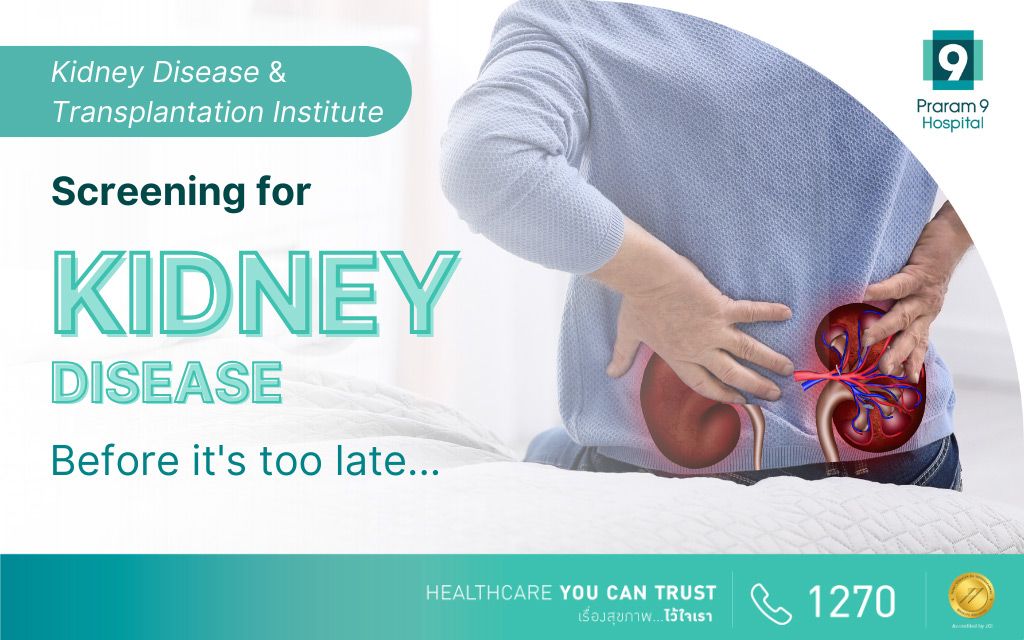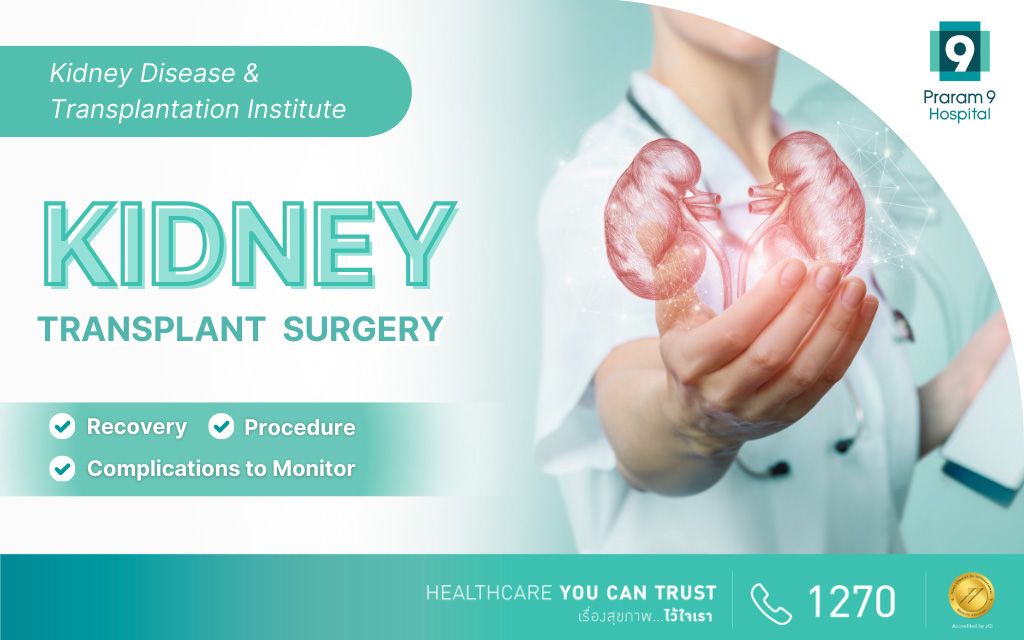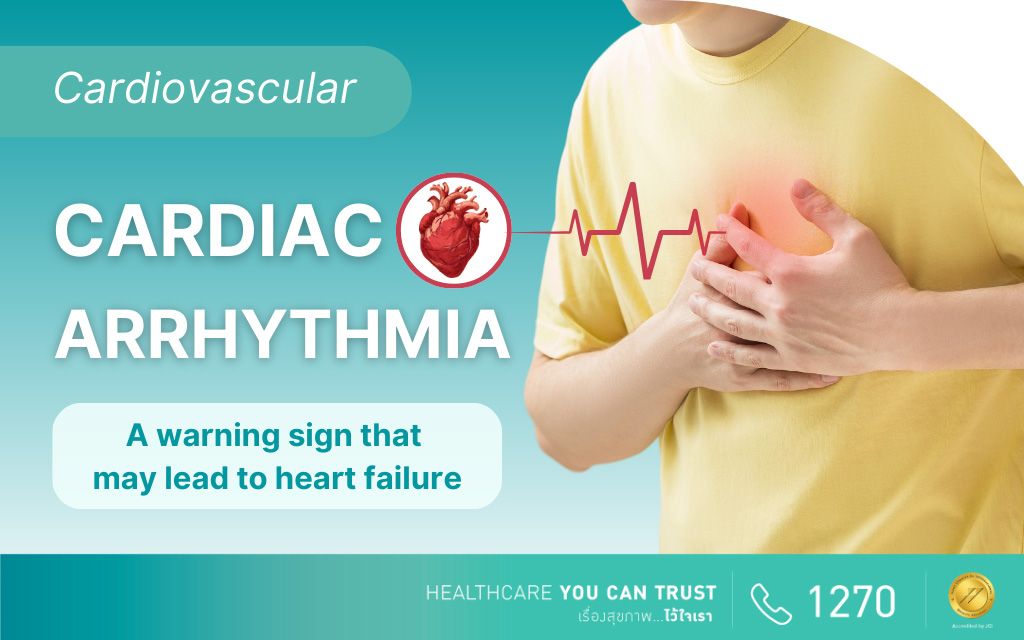Health Articles
Knowledge
Screening for kidney disease before it’s too late

The kidneys play important role in the body; they are responsible for various essential functions. They facilitate the elimination of waste through urine, regulate the body’s mineral balance, control water levels, and maintain the blood’s acidity and alkalinity. When renal dysfunction occurs, it leads to fluid retention, pulmonary edema, imbalances in mineral salts, anemia, vitamin deficiencies, and in severe cases, and the accumulation of toxins in the body.
Kidney disease can present acutely or chronically, with symptoms typically developing gradually. Consequently, many patients may not immediately recognize these abnormalities, allowing the condition to progress unnoticed. By the time it reaches an advanced stage, treatment becomes more challenging and complex. Thus, prioritizing kidney disease screening is paramount and should not be overlooked. Early detection of abnormalities not only facilitates simpler treatment but also preserves kidney function in the long term.
How dangerous is kidney disease?
Kidney disease encompasses various conditions including glomerulonephritis (nephritis and nephrotic syndrome, kidney inflammation), kidney stones, acute kidney failure, and chronic kidney failure. Acute kidney failure often requires complex treatment and may not always result in complete recovery. Chronic kidney failure, especially when associated with underlying conditions like diabetes or high blood pressure, poses significant challenges. Patients may remain asymptomatic in the early stages, leading to delayed treatment and decrease kidney function. Consequently, some individuals may eventually require dialysis due to the extent of kidney damage.
The prevalence of chronic kidney disease (CKD) is increasing among the Thai population. According to data from the Thai Kidney Association, there are approximately 20,000 new cases reported annually, with a consistent upward trend observed over the years. To address this growing concern, the association advocates for proactive screening among individuals aged 40 and above. This proactive approach aims to expedite the detection of patients or those at risk, facilitating prompt intervention and treatment. Ultimately, early detection and intervention are instrumental in mitigating the progression of CKD, thereby reducing morbidity and mortality rates.
Who should be screened for kidney disease?
- Individuals aged 40 years and older.
- Individuals with Non-Communicable Diseases (NCDs), also referred to as chronic non-communicable diseases, include:
- Diabetes
- Stroke and heart disease
- Chronic pulmonary disease
- Various cancers
- High blood pressure
- obesity
The majority, exceeding 70%, of kidney disease cases are attributed to diabetes and high blood pressure.
- Individuals with lifestyle habits that predispose them to kidney disease, such as inadequate water intake, preference for spicy or salty foods, etc.
- Those who misuse medications, dietary supplements, or herbal remedies, including self-prescription practices. Caution should be exercised, especially regarding over-the-counter pain relievers like NSAIDs, and consulting a healthcare professional is advised.
- Individuals with concurrent medical conditions, such as autoimmune disorders leading to kidney damage, kidney inflammation due to infections, kidney stones, gout, etc.
When is the appropriate time for kidney disease screening?
In the early stages of kidney disease, patients often present with no symptoms. Regular screening for kidney disease enables early detection and intervention, facilitating prevention, risk reduction, and the potential slowing of kidney deterioration, especially among high-risk individuals as previously mentioned. Early-stage symptoms of kidney deterioration may include subtle indicators, progressing to more severe and evident symptoms in advanced stages.
- Early signs/symptoms of kidney failure may include: nocturia (frequent urination at night), edema (swelling), and feelings of lethargy, accompanied by foamy or bloody urine.
- Symptoms indicative of severe kidney impairment encompass: loss of appetite, nausea and vomiting, fatigue, pallor, anemia, purpura, and pruritus (itchy skin). Additionally, pulmonary edema may occur. In cases of excessive waste accumulation, cognitive dysfunction or seizures may occur.
Therefore, prioritizing kidney disease screening is something that should not be neglected, and procrastination should be avoided. Delaying until symptoms indicates significant kidney tissue damage, hindering the possibility of substantial recovery. Additionally, severe symptoms indicative of advanced stages necessitate ongoing and costly treatment. Moreover, disease screening not only evaluates kidney function but also identifies latent (potential) illnesses, facilitating early intervention and treatment before complications escalate.
What factors are assessed in kidney screening tests?
As highlighted earlier, the kidney disease screening is particularly crucial for individuals aged 40 and above. This proactive approach facilitates early detection and prevention of severe kidney failure and other renal conditions. Screening for kidney disease typically involves:
- Blood tests are essential for assessing kidney function and detecting any underlying kidney diseases that may not present obvious symptoms including:
- Kidney function level
- Blood disorders
- Blood sugar levels/accumulated sugar in the blood
- Blood lipid levels
- Urine analysis, specifically evaluating protein levels and the presence of red blood cells, serves as a crucial indicator of kidney function. Elevated protein levels or the presence of red blood cells in the urine may indicate abnormal kidney function.
- Ultrasound examination of the urinary system provides valuable insights into the structural integrity and characteristics of the kidneys. This diagnostic test helps identify abnormalities within the urinary tract, including kidney tumors, stones, and injuries.
Preparation before kidney screening
- Avoid from consuming food and beverages for 12 hours before the test.
- Abstain from consuming alcoholic beverages for at least 24 hours prior to the test.
- Ultrasound examination of the urinary system is optimally conducted when urinary discomfort is at its peak, ensuring clear visualization of the bladder. Adequate fluid intake before the test may be necessary to ensure optimal bladder filling.
- Patients on regular medication should consult their physician regarding the necessity of discontinuing these medications before the test.
Summary
Chronic kidney disease frequently remains asymptomatic initially, with symptoms not manifesting until the kidneys are severely damaged. Thus, regular kidney disease screening is important. Early detection of abnormalities allows for prompt intervention, preserving kidney function to the greatest extent possible. Ignoring warning signs until end-stage kidney failure necessitates kidney replacement therapy, such as transplant surgery or dialysis. The latter option entails prolonged waiting periods for a suitable donor kidney and regular sessions on an artificial kidney machine, significantly impacting quality of life, incurring high costs, and affecting the patient’s mental well-being.














